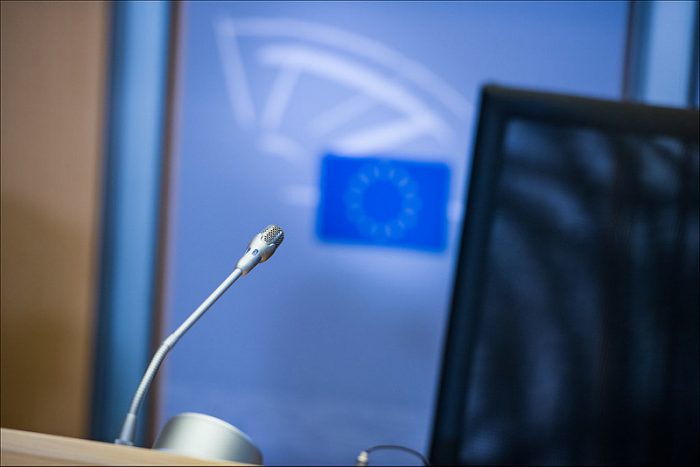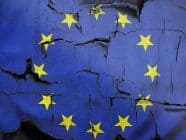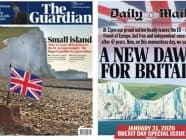Suddenly everyone is talking about the European Union. It’s a great irony of Brexit that in threatening the very future of the Brussels project, the shock vote has provoked unprecedented levels of interest in the collective’s embattled leaders and institutions.
The need for a European public sphere, where the continent’s affairs are discussed for themselves and not viewed through a national prism, is again thrown into focus.
“Brussels was dismissed for decades as ‘Oh, it’s so boring! The EU is so boring!'” says Matt Kaminski, editor-in-chief of Politico Europe, which in a prescient act last year launched as an outpost of the Washington DC-based politics and policy website. “We don’t think that’s true and that has been borne out in the last 16 months.”
Politico Europe, which registered two million unique visitors and five million pages views this month, finds itself on the doorstep of the big story. “We launched (in May 2015) two weeks before the British elections which have led to this (Brexit) outcome now, and in between we have seen the Greek debt crisis, the migration crisis, the terror attacks,” says Kaminski. “Europe hasn’t been the centre of attention in this way since 1989.”
The site has engaged the EU community like never before, especially with its gossip-rich Brussels Playbook daily newsletter.
But not everyone has been impressed by the impact of this arriviste. Media figures consulted by the European Journalism Observatory, though broadly supportive of Politico’s impact, claimed it sometimes adopted a sneering tone. It has been accused of being “sensationalistic” by Brussels old hands, and was condemned for “peep-show” journalism by the European Commission president Jean-Claude Juncker after it reported on his health problems.
Kaminski is unruffled by the criticisms, Juncker’s especially. “I wanted to buy an ad on the side of a bus here with that quote in giant letters,” he says, from his office on the Rue de la Loi, overlooking the European Commission’s directorate for International Cooperation & Development. “How anyone can suggest we are shallow when we are putting out more coverage on this city than it has ever seen before is just ludicrous.”
Politico Europe aims to cover Europe for ‘insiders’
Politico Europe, which is co-owned by the giant German publisher Axel Springer, has expanded its editorial staff to 60, (including 45 based in Brussels), many of them policy specialists. “We could outwonk anyone in this town any day,” says the editor, who stresses that – far from being superficial – the aim is to laser in on a highly specialist target audience. “Our mandate here is to cover this for the insiders.” Politico’s income is split between charging advertisers to reach its specialist audience, and professionals paying around euro 10,000 (depending on how many licences per subscriber organisation) for “PRO” subscriptions offering information on such subjects as technology and financial services.
Although Kaminski maintains it has brought “a very different tone and spirit” to Brussels coverage he is adamant that its role in the European public sphere is not to instruct the masses on the workings of the EU. “We are not trying to get as many people as possible to read us across Europe,” he says.
Wolfgang Blau, chief digital officer of Condé Nast International, is a leading advocate for the growth of pan-European media but expresses disappointment at what he sees as Politico Europe’s “slightly derogatory tone towards the EU in general”. Though he wishes the site well he complains that it refers to Brussels as a “town” and often explains the EU “in a way that you would explain it to Americans”.
In the wake of Brexit, he says, the requirement for stronger trans-European media is obvious. “What we are still missing and what we will now need urgently in these months and probably years to come, as the EU and UK redefine their relationship, is an ecosystem of platforms in which Europe can have this conversation with itself about what it wants to be.”
London-based media groups ‘culturally least equipped’ to lead pan-European publishing
Blau says that the dominance of the English language in global media means that UK- based news organisations – many of them deeply Eurosceptic – have had a disproportionate role in telling the EU’s story around the world, as American and Asian media have taken their lead from London. “It is the failure of continental news organisations that the narrative of the EU and of the Euro itself around the world is being created, shaped and continued by media organisations outside the Eurozone – and soon, as it turns out, outside the EU.”
He believes that the development of pan-European media is being held back by language barriers, the strong stakes that many leading news outlets have in covering national agendas (with titles such as El Pais literally defined by the nation state), and the economic problems of the news business.
There is a “paradox”, he says, in London media groups having the language advantage, the resourcing and the international publishing experience to take a lead in pan-European publishing but “culturally they are the least equipped”. As director of digital strategy at The Guardian, Blau pursued the idea of a Guardian Europe operation but says the organisation “was inherently looking towards the United States and former Commonwealth countries” and focused instead on Guardian US and Guardian Australia.
“The problem is not that British journalists have become Eurosceptic, it’s that they are not in Europe at all.”
Charlie Beckett, a media professor at the London School of Economics and founding director of POLIS, a think-tank on international journalism and society, says that the idea of a European public sphere was “always an elite project”. The UK media, he says, has never really embraced the idea and has pulled many of its correspondents back from Brussels.
“In the UK we have opted out of any intellectual engagement with that wider debate in good times, and now, in times of crisis,” he says. “Evidence of this is the gaping hole that the Brussels-based version of Politico is now filling. The problem is not that British journalists have become Eurosceptic, it’s that they are not in Europe at all.”
Some UK publishers still take a pro-European line. Robert Shrimsley, managing editor of FT.com recently told me that the FT considers itself a “European news organisation”. Andrew Tuck, editor of international magazine Monocle, says: “When we started back in 2007 we felt there was a place for a European voice. We were very keen not to be perceived as a British brand with an English eyeglass going over the world of news.”
The pan-European news channel Euronews saw its role during the Brexit debate as to “counter-balance” a “lack of a comprehensive pan-European perspective”, says editor-in- chief Peter Barabas. “The Brexit taught us that at times of crisis there is this vital need for a responsible, objective and accurate pan-European media that offers all Europeans factual insights into what national and local media don’t go into, because they are too busy with local politics.”
It was in the wake of the collapse of the Berlin Wall that Czech-born British publisher Robert Maxwell became something of a pioneer by founding The European in 1990, with the aim of capturing the spirit of the continent’s new unity. Two years later it was bought by the Barclay Brothers, now owners of the UK’s Telegraph Media Group. With staff mostly based in London, The European, saw its role as holding the institutions in Brussels and Strasbourg to account.
Charles Garside, the paper’s longest-serving editor (now managing editor of the Eurosceptic Daily Mail), recalls that the institutions – then representing only a dozen member states – were deeply resistant to the criticism of “a free press”. He said that the paper’s coverage of the 1992 Maastricht Treaty, by journalists from different countries, revealed that officials were being duplicitous in describing the implications of the agreement. “It was quite clear that what was being sold to the UK was very different from what was being sold to Germany, and so on. There was no doubt about it.”
There is a pan-European audience with a renewed interest in European affairs
The European closed in 1998. New Europe, founded as a Brussels newspaper by Greek publisher Basil Coronakis in 1993, has lasted much longer and is now a multi-platform product. The founder’s son Alexandros, the paper’s current editor, says that online publication has shown that “there is a pan-European audience for our website, and for our competitors’ websites”.
He sees numerous reasons for renewed interest in European affairs. “The more political European Commission, some strong personalities at the head-of-state level, and of course the back-to-back crises have been catalysts for the resurgence of the EU Public Sphere.”
For nearly 25 years, he argues, New Europe has been “uncovering the inner workings of the EU institutions and bridging the gap with EU citizens”.
He accepts that Politico Europe, with its “very large budget” has “of course made waves” but questions whether “they are sustainable in the long run”. The new site, he says, “seem to be here with the aim of making noise”.
Kolonakis points to a recent comment made to the New York Times by Politico staffer Tara Palmeri about EU leaders. “We are making them famous. We’re making them relevant, even when we are being critical.”
But at Politico Europe, Kaminski is happy with its journalism. “If the old guard in the bubble in Brussels doesn’t like our tone, well tough. I’m not going to apologise for putting out an interesting, well-written publication.” Politico, he says, has been transformational in moving beyond the nation-focused “siloed” approach of traditional news media. His staff in Paris and Berlin are native speakers (“I don’t want foreign correspondents”) and his newsroom has a correction rate which stands comparison with the most prestigious titles.
Most of all Kaminski, a Polish-raised former Wall Street Journal veteran, is convinced that in Brussels he is at the apex of world news. “Trump is a fascinating story,” he says. “But the real historic world-changing events have been happening here – as we saw last Thursday.”
Tags: BREXIT, Brussels, Charlie Beckett, Daily Mail, Eu, European Public Sphere, FT.com, Ian Burrell, Monocle, New Europe, Polis, Politico, Politico Europe, the Guardian, Wolfgang Blau












































